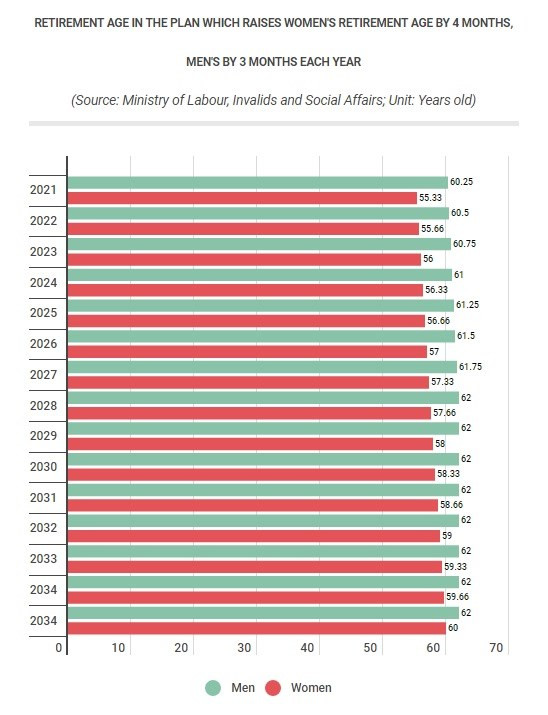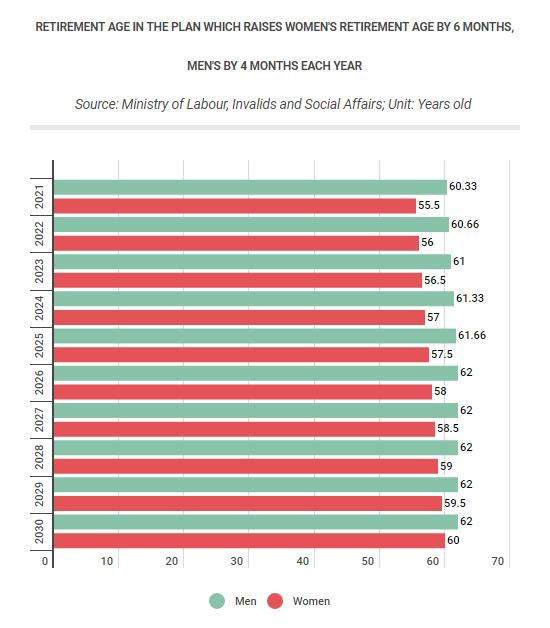 Participants discuss changes in the draft revised Labour Code at the dialogue workshop held in Hanoi on April 5 (Photo: VietnamPlus)
Participants discuss changes in the draft revised Labour Code at the dialogue workshop held in Hanoi on April 5 (Photo: VietnamPlus)
Hanoi (VNA) – The retirement age will be officially increased as from 2021. The draft revised Labour Code is proposing two plans on the hike with roadmap lasting for 15 or 10 years.
The increase of the retirement age aims to adapt to the population aging and the country’s socio-economic development situation. It is hoped to help not only optimise experienced and high-quality personnel to serve socio-economic development but also ensure the balance of the pension and death funds in the long term.
The issue was discussed at a dialogue workshop on gender equality at the workplace and new points of the draft revised Labour Code held by the Vietnam Chamber of Commerce and Industry in Hanoi on April 5.
Two plans on retirement age hike tabled
According to Resolution 28-NQ/TW on the reform of the social insurance policy, issued at the seventh session of the 12th-tenure Party Central Committee, the general retirement age will be increased as from 2021.
Mai Duc Thien, Deputy Director of the Department of Legal Affairs under the Ministry of Labour, Invalids and Social Affairs, said as directed by Resolution 28-NQ/TW, the draft revised Labour Code proposed that the retirement age of people working in normal conditions should be 62 for men and 60 for women in both plans.
In the first plan, as from January 1, 2021, the retirement age will be raised by three months for men and four months for women each year until it reaches 62 for men and 60 for women. It will take 15 years for women’s retirement age to reach 60 and eight years for men’s to reach 62.
In the second plan, as from January 1, 2021, the retirement age will be increased by four months for men and six months for women each year until it reaches 62 for men and 60 for women. Therefore, it will take 10 years for women’s retirement age to reach 60 and six years for men’s to reach 62.
The retirement age will be increased under a roadmap instead of immediately being raised to 60 for women and 62 for men in 2021. The Ministry of Labour, Invalids and Social Affairs is collecting opinions to perfect the retirement age hike plan.
Thien also noted that for special professions, labourers have the right to retire five years earlier or later than the general retirement age.
Labourers retiring early
Le Dinh Quang, deputy head of the labour relations division at the Vietnam General Confederation of Labour, said although it’s now the right time to raise the retirement age, a roadmap is necessary to increase the age gradually and not “shock” labourers. The increase also needs to help gradually narrow the gender gap to ensure labourers’ interests.
He noted the confederation is paying attention to labourers with special professions. Resolution 28 regulated that those working in heavy or hazardous occupations will have their retirement age reduced by five years from the general one. Therefore, though the retirement age is currently stipulated at 55 for women and 60 for men, most of workers at industrial parks and export processing zones do not work until this age.
It will be a problem if the retirement age is raised but there aren’t any particular mechanisms for labourers working directly at factories, he said.
The retirement age has been debated for a long time. Whether it should be raised by four months for women and three months for men, or by six months for women and four months for men, can be discussed later. However, what the confederation is concerned about now is the retirement age of labourers directly engaging in production activities, Quang emphasised.
He also pointed out the fact that those directly involved in production activities at industrial parks are usually unable to work until they reach the age of 55 for women and 60 for men. Therefore, the question is whether the retirement age hike will have big impact on the interests of this group.
According to the Vietnam Social Security, the actual retirement age in Vietnam is much lower than the regulated age. It was about 54 on average in 2012, with roughly 55 among men and nearly 53 among women, compared to the regulated age of 55 for women and 60 for men. In particular, the percentage of people retiring when they reach the full retirement age is only around 40.5 percent, while the percentage of those retiring before reaching this age is also high, more than 50 percent.
Quang suggested that the social insurance policy should be amended in a way that enables labourers to flexibly make choices to ensure their interests./.































